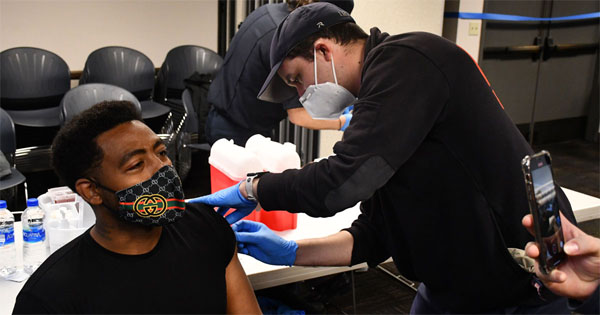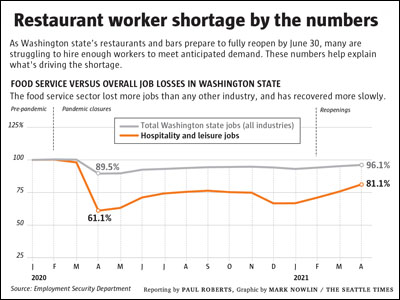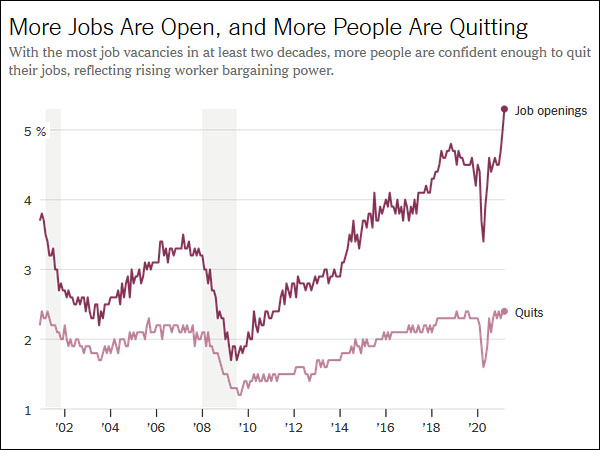NEWS ROUNDUP
Oil train sabotage | Freedom to attack Capitol | Workers gain leverage
Monday, June 7, 2021
COVID-19
► LIVE from the Seattle Times — Coronavirus daily news update, June 7 — The latest count of COVID-19 cases in Washington totals 440,057 infections (7-day average of new infections per day: 831) and 5,836 deaths.

► From the Seattle Times — The ‘two societies’: 97% of new COVID cases are among people who haven’t gotten the shots — Epidemiologists at King County found that of the 15,397 positive COVID cases in April and May, 14,895 were in people who hadn’t been fully vaccinated. That’s 96.7% of all local cases during a period in which King County passed the 50% vaccinated threshold, meaning half the population had been inoculated and half had not.
► From The Hill — 78% of unvaccinated Americans unlikely to change their minds: Gallup
► From Politico — Biden’s vaccine push fails to gain traction with African Americans — Less than a quarter of Black Americans had received their first Covid-19 shot as of June 3. That’s less than other racial and ethnic groups tracked by the CDC.
► From Bloomberg — Trumka hits Biden on delayed OSHA pandemic workplace regulations — The Biden administration has taken too long to implement Occupational Safety and Health Administration emergency regulations to ensure on-the-job protections for workers during the COVID-19 pandemic, said AFL-CIO President Richard Trumka.
THIS WASHINGTON
► From KUOW — Sabotage caused Washington oil-train disaster, rail union says — There’s only one way the oil train could have derailed like that on the snowy tracks north of Bellingham on Dec. 22, 2020, according to the union representing the rail crew and a retired federal investigator of railroad accidents: sabotage. “We know from the FBI investigation, from how trains operate, how trains work, how the couplers work, how the pin lifters work, that this incident was caused without a doubt by sabotage,” Korey McDaniel of the International Association of Sheet Metal, Air, Rail and Transportation Workers told BNSF Railway investigators, according to a hearing transcript obtained by KUOW.
► From the (Everett) Herald — As cells empty, state looks to close Monroe prison units — At least 20% of Washington’s 18,000 prison beds are empty right now. Another 20% could become vacant in the next two years. Faced with a rapidly shrinking inmate population, the state Department of Corrections is making plans to close living units in prisons across the state, with the Monroe Correctional Complex targeted for the biggest reduction. Late last month, corrections officials informed lawmakers, labor unions and councils for families of incarcerated people that 18 units containing 3,378 beds were being eyed for closure. A confluence of forces — pandemic, judicial and political — steered Washington to this juncture.
 ► From the Seattle Times — Where have all the waiters gone? On the cusp of reopening, a labor shortage threatens Washington restaurants’ recovery — After almost 15 months of pandemic restrictions, layoffs and losses, many restaurants, bars and other food service businesses face a new crisis: With just weeks to go before restrictions lift, a deep labor shortage is derailing hopes for a quick recovery — and renewing questions about the role of pandemic unemployment benefits. … Since last spring, food service workers have left unemployment — presumably because they’ve found jobs — at roughly the same rate as claimants in other sectors, according to ESD data. … The the sector faces another, more fundamental problem: many former food service workers are taking other types of jobs.
► From the Seattle Times — Where have all the waiters gone? On the cusp of reopening, a labor shortage threatens Washington restaurants’ recovery — After almost 15 months of pandemic restrictions, layoffs and losses, many restaurants, bars and other food service businesses face a new crisis: With just weeks to go before restrictions lift, a deep labor shortage is derailing hopes for a quick recovery — and renewing questions about the role of pandemic unemployment benefits. … Since last spring, food service workers have left unemployment — presumably because they’ve found jobs — at roughly the same rate as claimants in other sectors, according to ESD data. … The the sector faces another, more fundamental problem: many former food service workers are taking other types of jobs.
► From the News Tribune — Sound Transit pumps brakes on projects costing billions. Here’s how Tacoma will feel it. (editorial) — Faced with a nearly $8 billion shortfall caused by ballooning costs and declining revenues, Sound Transit is losing traction on several long-awaited regional projects. For South Sounders, the main impact is a bitter pill to swallow: a delay in Tacoma’s high-speed light-rail connection to Federal Way and points north from 2030 to 2032.
SOUTH OF THE BORDER
► From Accountable Northwest — Rep. Nearman plotted the Capitol attack at the Freedom Foundation headquarters — Video was released that shows Rep. Mike Nearman coordinating his violent attack on the Oregon Capitol while at the Salem, Ore., office of the “Freedom” Foundation, a billionaire-funded extremist organization that has been trying and failing to destroy unions along the West Coast. He called it “Operation Hall Pass.” The video shows him telling far-right activists to use his cell number and text him when they were outside the Capitol so he could allow them in. The revelation is part of an ongoing story on Rep. Nearman, who faces criminal charges, jail time and expulsion from the legislature for allowing violent rioters into the Oregon Capitol on December 21, 2020, in what was a dark foreshadowing of the deadly insurrection in Washington, D.C.
EDITOR’S NOTE — Nearman still serves as a “senior fellow” at the Freedom Foundation.
The Stand (Oct. 10, 2019) — The wacky world of the Freedom Foundation — How the anti-union group’s staffers become leaders of a nutty post-apocalyptic “prepper” movement.
► From the Washington Post — Before violent Oregon Capitol breach, GOP lawmaker coached people on how to slip in, video shows — The meeting video, that apparently was recorded the week before the Dec. 21 breach, sheds new light on Oregon GOP state Rep. Mike Nearman’s earlier discussions before he walked out of a special session and opened the door for maskless demonstrators who rushed inside and clashed with police. Dozens eventually entered the building that day, some attacking officers and damaging property, video shows.
BOEING
► From the PSBJ — Boeing may have moved on — but have we? (by Howard Wright) — The bottom line is that while we may still think of Boeing as the world’s largest independent manufacturer of commercial aircraft and a Seattle-based company, it’s really a Puget Sound-based division of the world’s second-largest military contractor headquartered in Chicago. The company’s behavior over the last decade provides a timely reminder of the importance of stakeholder capitalism. It’s hard not to wonder what would be different if Boeing had embraced the notion that all stakeholders — customers, employees, suppliers, vendors, shareholders and communities — are critical to the organization’s success. Instead, Boeing’s shareholder primacy created a toxic culture that led to catastrophic events.
THAT WASHINGTON
 ► From the Washington Post — Manchin says he will not support voting rights bill, in blow to Biden agenda and a warning to his colleagues — Sen. Joe Manchin III (D-W.Va.) said he would not support federal voting rights legislation that his party has argued is critical for preserving democracy, in an announcement that effectively turned the path ahead for all other major items on Biden’s agenda into quicksand. Manchin also defended the filibuster and said he would “not vote to weaken or eliminate” the Senate rule that requires 60 votes for most legislation to pass, all but guaranteeing that any legislation opposed by even a small number of Senate Republicans will fail.
► From the Washington Post — Manchin says he will not support voting rights bill, in blow to Biden agenda and a warning to his colleagues — Sen. Joe Manchin III (D-W.Va.) said he would not support federal voting rights legislation that his party has argued is critical for preserving democracy, in an announcement that effectively turned the path ahead for all other major items on Biden’s agenda into quicksand. Manchin also defended the filibuster and said he would “not vote to weaken or eliminate” the Senate rule that requires 60 votes for most legislation to pass, all but guaranteeing that any legislation opposed by even a small number of Senate Republicans will fail.
► From the AP — Time ticking away, Democrats face wrenching test on agenda — Bracing for political trouble, Senate Majority Leader Chuck Schumer warned Democratic colleagues that June will “test our resolve” as senators return Monday to consider infrastructure, voting rights and other stalled-out priorities at a crucial moment in Congress.
► From the NY Times — Senate poised to pass huge industrial policy bill to counter China — Faced with an urgent competitive threat from China, the Senate is poised to pass the most expansive industrial policy legislation in U.S. history, blowing past partisan divisions over government support for private industry to embrace a nearly quarter-trillion-dollar investment in building up America’s manufacturing and technological edge.
 ► From the Washington Post — FBI inquiry of USPS chief DeJoy threatens bipartisan overhaul bill — The FBI investigation into Postmaster General Louis DeJoy threatens to fray a fragile bipartisan and cross-industry coalition that supports financial relief legislation for the U.S. Postal Service, opening a new vein of turmoil for the embattled agency. … Some House Democrats late last week privately considered dropping their support for the measure in light of the DeJoy investigation, said four people with knowledge of the talks, reasoning that the chamber could advance more aggressive legislation on a party-line vote, including provisions on voting access and postal banking and funding for electric mail vehicles.
► From the Washington Post — FBI inquiry of USPS chief DeJoy threatens bipartisan overhaul bill — The FBI investigation into Postmaster General Louis DeJoy threatens to fray a fragile bipartisan and cross-industry coalition that supports financial relief legislation for the U.S. Postal Service, opening a new vein of turmoil for the embattled agency. … Some House Democrats late last week privately considered dropping their support for the measure in light of the DeJoy investigation, said four people with knowledge of the talks, reasoning that the chamber could advance more aggressive legislation on a party-line vote, including provisions on voting access and postal banking and funding for electric mail vehicles.
► From the AP — ‘Get used to me’: Postmaster evokes Trump style in Biden era
► From Politico — Biden’s back door to wage hikes — President Joe Biden’s pledge to offer American workers a path to higher income and more jobs is getting a boost from an unlikely source: the country’s struggle to fully emerge from the pandemic. Labor shortages in key industries are giving many workers their best shot in years to bargain for substantial wage increases, with some companies ramping up pay to attract employees, particularly restaurants.
► From Reuters — Clock is ticking for Republicans on infrastructure, Biden officials say
► From the Washington Post — Supreme Court begins its sprint to finish — and a decision by one justice might be the most important — Supreme Court justices on Monday will begin the sprint to conclude their work this month, with pending decisions on issues as diverse as the fate of the Affordable Care Act and compensation for college athletes. But perhaps the most consequential decision has no deadline and will be made by a court of one: 82-year-old Justice Stephen G. Breyer.
► BREAKING from the AP — Supreme Court rules against immigrants with temporary status — A unanimous Supreme Court ruled Monday that thousands of people living in the U.S. for humanitarian reasons are ineligible to apply to become permanent residents.

► From Vox — Paid leave is incredibly popular — even with Republicans — Federal paid leave is overwhelmingly popular — so popular, according to a new poll, that people are willing to pay to keep it. That poll, commissioned by an advocacy group, surveyed 1,070 likely voters from seven battleground states (Arizona, Florida, Georgia, Nevada, North Carolina, Pennsylvania, and Wisconsin). It found that 84 percent of likely voters, including 74 percent of Republicans, support paid leave programs; 69 percent of those polled, including 55 percent of surveyed Republicans, would support a federal leave standard even if they’d have to pay more in taxes to sustain it.
NATIONAL
► From NPR — A lifeline for the unemployed is about to end in half the country. Here’s what’s at stake. — The United States is about to embark on a big national experiment with 4 million unemployed workers serving as guinea pigs. And it all centers on $300 a week. The payment was intended as a lifeline for millions of Americans who lost their jobs during the pandemic: an extra $300 a week on top of regular unemployment benefits. Half the states — all led by Republicans — are cutting off enhanced unemployment benefits in the coming weeks in hopes of pushing people back to work. The other 25 states will keep paying out the enhanced benefits through early September as Congress intended.
► From the NY Times — Republicans, don’t ignore the evidence on ‘labor shortages’ (by Heidi Shierholz) — There is always a chorus of employers complaining they can’t find the workers they need. We have to look beyond anecdotal reports to fully understand the data. As we sift through the latest jobs report, three key findings rise to the surface. Bona fide labor shortages are not pervasive. Wage growth decelerated in May in most sectors. And in the vast majority of sectors, wages are growing solidly but not fast enough to raise concern about damaging labor shortages, given that job growth is also strong.
TODAY’S MUST-READ
► From the NY Times — Workers are gaining leverage over employers right before our eyes — The relationship between American businesses and their employees is undergoing a profound shift: For the first time in a generation, workers are gaining the upper hand. The change is broader than the pandemic-related signing bonuses at fast-food places. Up and down the wage scale, companies are becoming more willing to pay a little more, to train workers, to take chances on people without traditional qualifications, and to show greater flexibility in where and how people work. The erosion of employer power began during the low-unemployment years leading up to the pandemic and, given demographic trends, could persist for years.
The Stand posts links to Washington state and national news of interest every weekday morning by 10 a.m.








